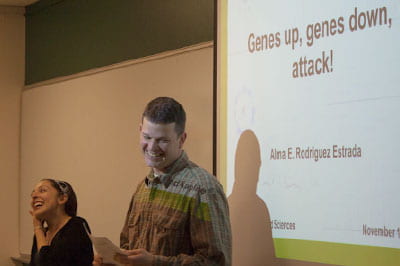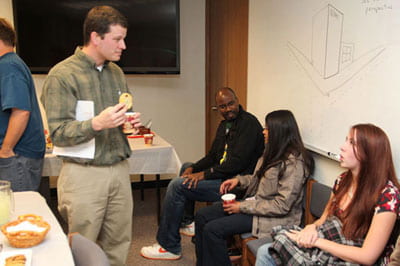NAS Seminar Series engages campus scientific community
 Every other Friday afternoon, the third floor of the Environmental Sciences Building is one of the busiest places on campus. At a time when many students, faculty and staff are winding down the week, the Natural and Applied Sciences program is gathering for a seminar series featuring food, fun and riveting research.
Every other Friday afternoon, the third floor of the Environmental Sciences Building is one of the busiest places on campus. At a time when many students, faculty and staff are winding down the week, the Natural and Applied Sciences program is gathering for a seminar series featuring food, fun and riveting research.
[youtube id= sxjQPi-Hb_E width= 400 height=300]
“Some of the history of the NAS seminar predates me,” said Associate Prof. Mathew Dornbush, one of the series coordinators. “Apparently we had a pretty vibrant one sometime in the past, but it had kind of run out of energy and it disappeared long before I got here. We all recognized — new people, existing people — that we really need to bring back a seminar to have a vibrant academic atmosphere.”
So Dornbush and several NAS colleagues did just that, re-launching the series in fall 2011. The biweekly seminars, which begin with a social before the main lecture, quickly became well-attended events.
“The goal really was to address contemporary issues in science, society and our environment,” Dornbush said. “And we wanted it to reflect the interdisciplinary nature of both the NAS Department and of our interdisciplinary graduate program, the Environmental Science and Policy graduate program.”
The NAS seminar lectures have covered a wide variety of topics, said NAS Chair Prof. Greg Davis.
“We’ve had talks that are ecological in nature (and) more physical science in nature,” Davis said. “Most have been fairly applied — not too much in the way of theoretical work has been presented. For the most part (the talks are) designed to be accessible by people that have a well-rounded background in the sciences.”

Assistant Prof. Alma Rodriguez Estrada delivered her NAS series lecture, titled “Genes up, genes down, attack!” during fall semester 2011. She’s enjoyed the chance to hear from her colleagues on a variety of topics.
“It’s just so (many) different things that we have been learning from the seminars,” Rodriguez Estrada said. “It’s been great to have the opportunity to learn about other faculty research, but also to learn about local issues. So it’s just great to be able to learn what is going on in this area.”
Students, no matter what their level, benefit as well, Davis said.
“I think it’s important that the advanced undergraduates and the graduate students can see what type of scholarship is going on here,” Davis said, “see more about what are the current problems that are being worked on in different fields — maybe get some ideas for themselves in terms of where they may wish to go in terms of their scientific careers.”

Organizers and attendees credit the seminars’ success to interesting and varied research and a regularly scheduled time — not to mention the fun factor.
“I think there’s a big social aspect, getting people together and take some time, stop work a little bit early on every other Friday and get together, socialize for a half hour,” said Associate Prof. Michael Zorn, who presented the last seminar of fall semester 2012 on Nov. 30. “And then I really like just seeing what people are up to. … I think that’s probably what I like the most, is just learning about what other people are doing.”
Click here to see photo galleries from recent NAS Seminar presentations.
NAS series alumni
The following faculty members and guests have delivered NAS Seminar lectures since the series was revived in fall 2011:
Fall 2012:
Angela Bauer, Human Biology — “Are there hormones in your drinking water?” (Sept. 7, 2012)
Brian Wilsey, Iowa State University — “Biodiversity and ecosystem functioning differences between native and novel exotic dominated ecosystems: Are we entering the Anthropocene epoch?” (Sept. 21, 2012)
Heidi Fencl, NAS — “The Box and the Boson: Reflections on Teaching Physics Process in an Answers-Oriented World” (Oct. 5, 2012)
Michael Draney, NAS — “What I’m trying to do in Panama” (Oct. 19, 2012)
Joseph Peterson, UW-Oshkosh — “Dinosores — Injury and Behavior in Cretaceous Dinosaurs” (Nov. 2, 2012)
Christopher Martin, Humanistic Studies — “The Rational Structure of the Order of Things” (Nov. 16, 2012)
Michel Zorn, NAS — “Environmental Sensors for Continuous, In-Situ Water Monitoring in the Great Lakes” (Nov. 30, 2012)
Spring 2012:
Daniel Meinhardt, Human Biology — “Shishmaref, Alaska: On the front line of global climate change” (Jan. 27, 2012)
David Dolan, NAS — “Lake Erie: reports of its death have been greatly exaggerated (Again!)” (Feb. 10, 2012)
Patricia Terry, NAS — “Sustainability: Lessons from Europe” (Feb. 24, 2012)
Daniel H. Zitomer, Marquette University — “Anaerobic co-digestion for sustainable waste management” (March 23, 2012)
Stephen Weeks, University of Akron — “Patterns of evolutionary transitions between hermaphroditism and dioecy in animals” (April 6, 2012)
Dallas Blaney, Public and Environmental Affairs — “Environmental flows, political dams” (April 20, 2012)
Steven Dutch, NAS — “How the West dominated technology, or what I learned from my general ed course” (May 4, 2012)
Fall 2011:
Mathew Dornbush, NAS — “Colonization and consumer mechanisms promote dominance of the exotic herb garlic mustard in a Wisconsin, USA forest” (Sept. 16, 2011)
John Luczaj, NAS — “The geology of Brown County: Challenges of bedrock mapping in a glaciated landscape” (Sept. 30, 2011)
Robert Howe, NAS — “Termites, fire, and cane toads: ecology in Australia’s Northern Territory” (Oct. 14, 2011)
John Katers, NAS — “Life cycle inventory for wood pellet manufacturing in Wisconsin” (Oct. 28, 2011)
Alma Rodriguez Estrada, NAS — “Genes up, genes down, attack!” (Nov. 11, 2011)
Jorge Estevez, NAS — “Removing a carcinogen from groundwater: the alkaline reaction pathway for chloroform decomposition in solution” (Dec. 2, 2011)


